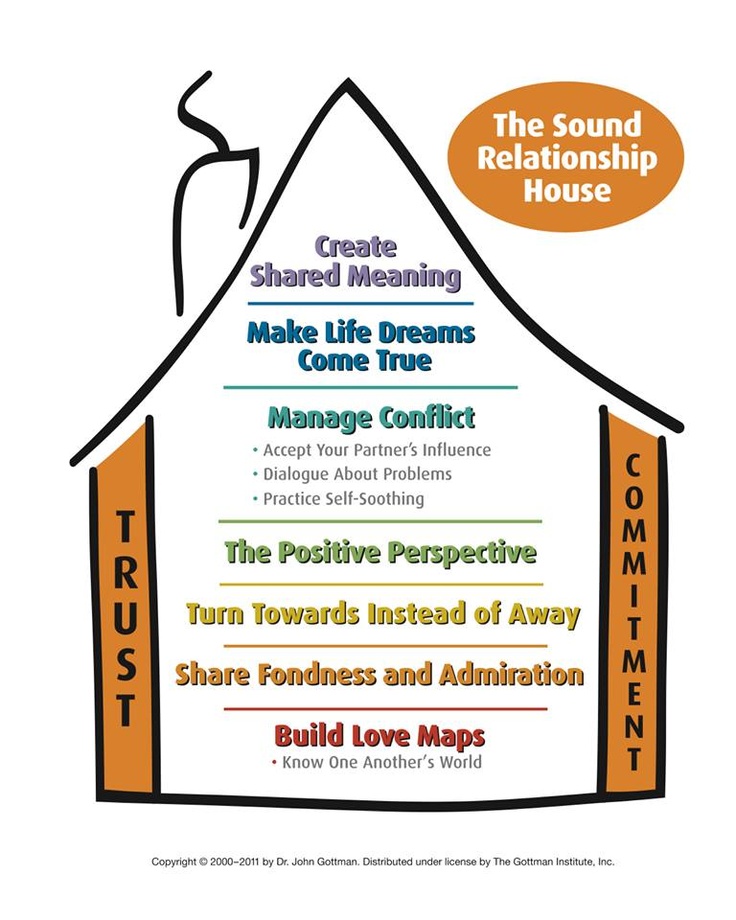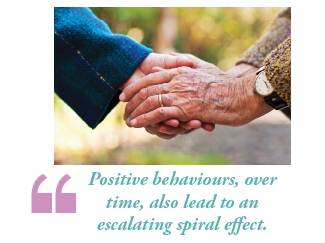A study in Love: Exploring Relationships with the Gottman Method

About 12 years ago, I made a stunning discovery: my then 8 year relationship was predicted to end in divorce! Who was making such a shocking prediction? None other than the world’s leading relationship expert: American psychologist John Gottman.
I had come across one of Gottman’s book, The Relationship Cure, prominently displayed at my local library. I was already familiar with Gottman’s work, he had conducted 40 years of solid long-term research on thousands of couples, and I considered myself happily married, so as I took the book home with me I assumed it would be for professional interest only.
But as I read the book later that day, I was horrified to discover that my behaviour was a serious threat to the future of my relationship: if I didn’t change then Gottman’s research predicted that my marriage was doomed to fail.
So what was I doing that was so destructive? Was I having an affair? No. Was I secretly running up a huge debt? No. Was I swinging from the rafters high on drink & drugs? If only. Actually what I was doing was far more innocent: I was reading. Yes, you read that right. Reading. A little obsessively, granted. And to understand how reading became a major threat to my relationship we need to go back to Gottman’s research.
The research
When John Gottman started his life’s work in the 1970s, no-one really knew what made relationships work or breakdown: the research just hadn’t been done. Human nature being what it is, that did not stop people setting themselves up as ‘experts’ in the field and at that time the leading theory was that people in great relationships were having long discussions with one another about their relationship and any difficulties that they might be having. And it was this great communication that explained their successful relationships.
When Gottman started out he was determined to apply the scientific method, to the best of his ability, to research what made relationships succeed or fail. To this end he designed a number of innovative methods of study at his so-called ‘Love Lab’ in Seattle. One such method involved inviting couples to holiday together in an apartment especially adapted for the purpose of collecting data. They were to bring their belongings and pets, and relax and spend time together. Much like in today’s Big Brother television series they agreed in advance to being filmed in most areas of the house for most of the day and evening.
Another of Gottman’s methods was to ask couples to individually fill in lengthy questionnaires about their relationship. He would then ask them to discuss their relationship while being filmed, and while attached to monitors that recorded their heart rate, blood pressure, and skin conductivity to help gauge their stress levels. In one of these filmed sessions they would be asked to discuss areas of conflict. After each such session they would be interviewed separately about what they had been feeling and thinking at various points in the discussion.
Gottman carried out his research on couples of all ages, gay and straight, and at all stages of their relationship.

The Findings
As you can imagine, these research methods produced huge amounts of data. As the first data came in Gottman was surprised to find that practically none of the couples, whether happy or otherwise, were having the lengthy discussions about their relationship that the theories of the day predicted.
Instead couples were discussing more mundane things, such as their pets, their children, or whether they needed to find a better plumber. He assumed that there must be something wrong with the quality of the data and so strove to improve and refine his team’s research methods. However, whatever changes they made, as more and more data came back from hundreds and then thousands of couples, they kept hitting the same problem: none of their subjects were having the predicted deep discussions about their relationship.
Gottman was forced to conclude that the deep conversation theory was wrong. He asked his team to go back to the data and see if they could find any patterns in what was actually happening.
Over the years what Gottman went on to discover is that, contrary to common belief, communication problems are only a symptom, not the cause of relationship breakdown. Gottman found that there are two major patterns of relationship breakdown. One involves escalating conflict and the other does not.
Escalating conflict
All relationships have some degree of conflict. In the first pattern of relationship breakdown though, conflicts get worse and worse and more and more common. Gottman found that in conflict situations, one partner usually tries to bring the conflict to an end. Gottman called this a Repair Attempt. Sometimes Repair Attempts work and conflict comes to an end; sometimes they do not work and the conflict continues to escalate. In their attempts to understand what worked in bringing conflict to an end, Gottman’s team first looked at the quality of the Repair Attempt. They found that this was not the crucial factor (poor quality Repair Attempts could work and conversely, good quality Repair Attempts could fail).
What they eventually discovered was that the crucial factor in determining whether a Repair Attempt worked or not was whether the person on the receiving end of it heard it and responded accordingly. And what that depended on was the underlying quality of the friendship: in other words what they were doing when they were not in conflict.
When we first get together with our partners, we all tend to have great quality friendships. What Gottman discovered was that there are behaviours that in the early days of a relationship, which we pretty much all do without thinking about them too much. But unbeknownst to us these small things nourish and strengthen our relationship. Unfortunately, as our relationship becomes long-term and we become again more focused on our own lives, many of us stop doing these all important small things.
Gottman’s major finding was this: the real cause of relationship breakdown is small daily behaviours that either harm or strengthen & protect the relationship. It is getting these little things right that creates the foundation for easy communication about any difficulties as they arise.
Behaviours that harm
Not paying attention
One of the behaviours that is most harmful over time to your relationship is not paying attention when your partner is trying to talk to you. This is what I was doing with my constant reading. One of our essential needs as a human being is attention. This is something psychologists have long known. Everyone needs someone they can talk to, someone with whom they can share & discuss their ordinary daily concerns and preoccupations, and even someone whom they can be boring with. This is massively important.
When Gottman and his team talked to people who were being regularly ignored or blocked in their attempts to talk to their partner and asked them how they felt, they were amazed at the level of hurt and the degree of harm that was being done, often unwittingly. These were not , on the face of it ‘important’ conversations: they might have wanted to talk about the cat’s food, the football results or some gossip at work. In other words ordinary every day stuff –but when their partner was too busy on the computer, watching the TV, or reading to listen to them, they felt hurt, neglected and unloved. They felt ignored and that their concerns were unimportant to their partner. Gottman and his team were amazed at how short a time it was between being on the receiving end of this behaviour and stopping trying altogether to get a partners attention. Not surprisingly, this would then lead to the second stage of a relationship’s deterioration: at least one partner would start having very negative thoughts about the other.
Focusing on the negative
It is not a very big leap from feeling unloved and uncared for to seeing the other partner as unloving, uncaring, and selfish. A partner on the receiving end of this lack of attention will usually withdraw from the other and start to have a very negative internal dialogue and expectations of their partner. They start to find fault with lots of things their partner is doing and also, importantly, to fail to see the good things their partner is doing.
Over-time an increasingly hostile atmosphere develops in the home with criticism, defensiveness, and contempt taking root. This turns into a spiral of increasingly low expectations with both partners now losing sight of any positives and developing negative expectations of each other and of the relationship. Psychologists call this stage of relationship deterioration, ‘Negative Sentiment Override’ because the whole relationship becomes suffused with negativity and hostility.
Letting affection die
In the second pattern of relationship breakdown there is no escalating, open conflict. Instead there is nothing. There is a complete loss of emotional connection with the other partner. This couple increasingly lead separate lives and eventually have nothing to say to each other. This is the couple that you see in a pub or restaurant sitting for the whole evening in silence. Gottman discovered that this is what happens when couples let affection die.
Behaviours that protect
Not surprisingly, the behaviours that protect and can help to rebuild a relationship are the exact opposite of those that cause the damage.
Turning towards
‘Turning Towards’ is the term Gottman gives to connecting with and paying attention to your partner during day to day life. Making the effort to put down what you are doing and engage with your partner and what is important to them is one of the most effective ways of making your partner feel appreciated and cared for.
Focusing on the positive
Actively choosing to focus on the things your partner is doing right, and ideally acknowledging those things or praising them is another key behaviour that can help to create the “culture of appreciation” that develops in the most positive relationships.
Keeping the pilot light lit

Gottman refers to little acts of affection – like a squeeze on the arm, or a kiss on the cheek - as keeping the pilot light lit. It is only if the pilot light is still burning that candle-light dinners and weekends away have any hope of reviving a flagging romance.
The good news is that by being aware of all this, we can start to repair our relationships and often turn a struggling relationship around, as I learnt, by applying these behaviours in my own case. Positive behaviours, over time, also lead to an escalating spiral effect. Positive Sentiment Override is what psychologists call it when the whole relationship becomes suffused with positive expectations and supportive behaviour.
In a relationship like this, when there is conflict - as there is in any long-term relationship - attempts to end the conflict are heard by the partner on the receiving end (who, after all feels loved, cared for and supported) and the Repair Attempt succeeds: so conflict quickly fizzles out.
But a word of warning: old habits die hard - it was not easy and took a lot of effort on my part to turn around my long established bad behaviours. What you are looking at is a marathon not a sprint, but if you succeed the rewards of creating a loving, supportive home life are well worth the effort.
Ann Marie Taylor is a Relationship Coach & Human Givens Psychotherapist with practices in Greystones & Dublin.
You can contact her at: 0863549969 or [email protected]. For details of up coming workshops please check her website: www.brainheart.ie
Latest Issue
Upcoming Events
-
17/04/2020 to 26/04/2020
-
18/04/2020
-
23/04/2020
-
15/05/2020 to 23/05/2020
-
16/05/2020 to 17/05/2020
Recent Articles
Article Archive
- May 2017 (4)
- June 2017 (11)
- July 2017 (7)
- August 2017 (2)
- September 2017 (1)
- October 2017 (3)
- November 2017 (4)
- December 2017 (3)
- April 2018 (2)
- June 2018 (2)

